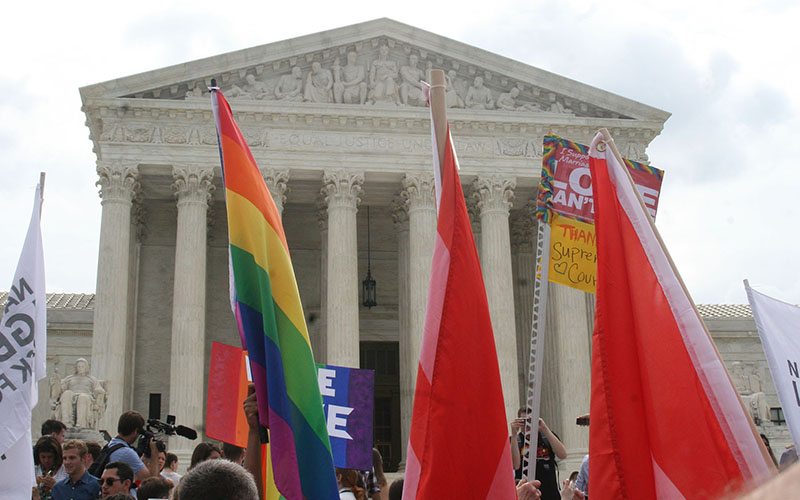
Supporters rallied outside the Supreme Court after it ruled last summer that banning same-sex marriage was unconstitutional, one of several gains in gay rights in recent years. (Photo by Nihal Krishan/Cronkite News)
WASHINGTON – It’s been a good couple of years for LGBT rights in America, with the Pentagon allowing gays to serve openly in the military and the Supreme Court declaring same-sex marriage bans unconstitutional.
But a Human Rights Campaign report released this week said the fight for gay rights is not over yet.
The group’s 2015 State Equality Index ranked states for their laws to protect – or not – gay rights at home and in the workplace. It said that 28 states, including Arizona, had laws that undermine gay rights or leave lesbians, gays, bisexuals and transgender (LGBT) individuals open to discrimination.
That is a far cry from the “explicit” non-discrimination laws that HRC legal director Sarah Warbelow said should be in place.
“There is not explicit nondiscrimination laws in place at the federal level and the majority of states don’t have those protections at the state level either,” Warbelow said in a phone call Wednesday, the day the report was released.
It was the second year for the report, and the second year that Arizona fell into the lowest category: “high priority to achieve basic equality.” That ranking means a state lacks basic equality for gay people, like nondiscrimination laws.
Neighboring states all fared better in the report. California and Colorado were among six states and the District of the Columbia in the top category for their “robust” nondiscrimination laws.
Utah, Nevada and New Mexico were among 10 states in the third category, “building equality,” for taking steps toward protections but still falling short in some areas. That was one level above Arizona and the bottom category.
“The state of Arizona should really be focusing on nondiscrimination laws and ways that they can put in place that basic level of fairness,” she said.
The report rated states on what the HRC sees as negative and positive laws surrounding gay rights. In Arizona, the “negative” laws cited in the report included transgender exclusions in Medicaid, restrictions on LGBT topics in schools, and the lack of a prohibition on discrimination in adoption or foster care placement, among others.
But the report gave Arizona credit for “positive” laws that included joint adoption, cyberbullying protections and gender marker changes on state IDs – which allow a transgender individual to request a change on birth certificates and drivers’ licenses.
Warbelow said there’s a lot of work to be done, but that the HRC is optimistic.
“Our approach really has been to take a positive outlook, and what we want Arizona to walk away from on this report is to say we should be making this a priority,” Warbelow said.